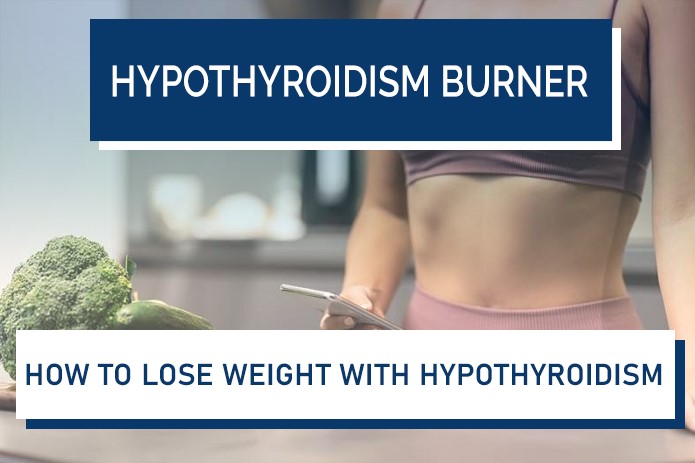
Are you feeling hypothyroidism is hijacking your life, increasing your weight, preventing you from losing weight, and stopping you from enjoying energy-filled happy life?
Losing weight is a challenge, and if your metabolism has slowed down and you don’t have the energy to put more effort, then the whole weight loss process looks like an uphill task.
However, if you break down steps into a small checklist, you can also lose weight. So, in this Hypothyroidism Burner guide, I will teach you how to lose weight with hypothyroidism. Many women have already lost a good amount of weight, and many are doing it as well.
Note: If you want to treat hypothyroidism without hormone replacement therapy, then check out this!
This Hypothyroidism Burner guide comes after my five years of research and personal experience getting to the root cause of hypothyroidism. You will find out how to stop thyroid disease, lose weight, and keep it off to enjoy energetic life.
This Hypothyroidism Burner guide will cover:
- How to lose weight with hypothyroidism by excluding the food that increases the risk of symptoms related to thyroid disease.
- Which foods do you have to include in your diet to lose weight when having hypothyroidism.
- How intermittent fasting balances your hormones and boosts your metabolism.
- Some effective stress relief techniques will bring hormonal harmony to your body and improve your sleeping pattern.
- How you can reduce toxics exposure in your life and remove toxins from your body.
- How exercising every day can improve metabolism and which exercise you should do to boost your metabolism.
- What’s the role of vitamins, minerals, and nutrients to stop the progression of thyroid disease.
- It is the time to take your energetic and happy life back.
Without further ado, let’s start with this Hypothyroidism Burner guide.
What You Should Know About Hypothyroidism?
Hypothyroidism is one of the thyroid disorders in which the thyroid gland doesn’t produce enough thyroid hormones to keep body functions working correctly.
Thyroid disorder is a common condition as studies show us 13% of people experience abnormal thyroid levels once in their lives. Women have eight times higher chances of obtaining thyroid disorders than men.
The thyroid is the butterfly-shaped gland located in front of your neck. Its primary function is to release thyroid hormones when it receives a signal from thyroid-stimulating hormone (TSH).
When the thyroid gland fails to produce enough thyroid hormone, it creates a condition called hypothyroidism, also called low thyroid.
The thyroid is responsible for many functions of the body, and when its levels go down, it impacts many functions, such as metabolism, heart rate, digestion, mood, and breathing.
Related: Hypothyroidism Is NOT The Life Sentence You Think It Is
Why Do People With Hypothyroidism Gain Weight?
Many doctors linked hypothyroidism with weight gain because the two most active thyroid hormones, triiodothyronine (T3) and thyroxine (T4), affect the metabolism by interacting with the fat cells, muscles, pancreas, and liver.
When the body has a low level of these thyroid hormones, it becomes difficult for metabolism to burn calories for energy. For this reason, the most common symptom of hypothyroidism is low energy level. Additionally, low thyroid hormones reduce the fat-burning ability, and the body stores calories instead of burning them.
Doctors recommend getting the treatment for hypothyroidism before losing weight, but this approach can lead to further weight gain.
Note: If you want to treat hypothyroidism, then check out this video.
Is It possible to lose weight with hypothyroidism?
Yes, it is still possible to lose weight with hypothyroidism, but your approach needs strict hormone monitoring, a diet plan, and regular exercise. We are going to discuss these steps below.
Here are the seven steps to lose weight while controlling hypothyroidism:
How To Lose Weight With Hypothyroidism Using The Hypothyroidism Burner Guide
The Hypothyroidism Burner guide includes seven steps. Every step is essential, so don’t miss anyone of them if you want to lose weight with hypothyroidism and keep it away. These steps will stop the progression of thyroid disease, boost metabolism, and improve energy levels.
Step 1: Regulate Your Thyroid Hormones:
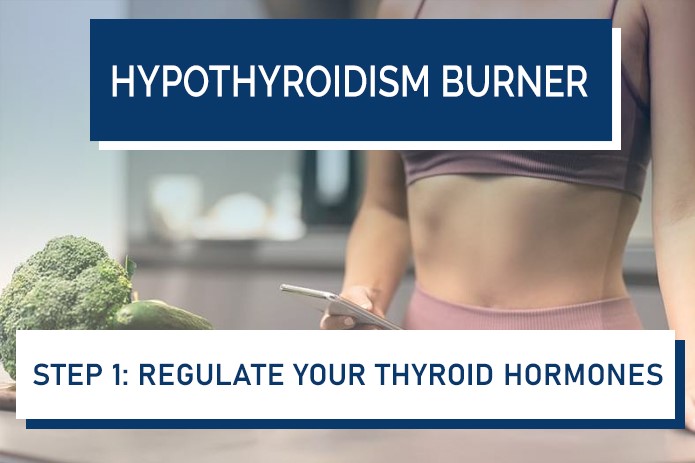
We all know diet and exercise are essential steps for losing weight, but you should keep thyroid medications on top priority when you have hypothyroidism.
If you don’t regulate your TSH and two essential thyroid hormones, T3 and T4 thyroid hormones, weight loss will become impossible.
There are two methods to fix your thyroid hormones.
Thyroid medications provide a wide range of options, and many thyroid medicines are different in their composition and working mechanism. So, you have to work with your doctor to find the right type of medication for you and the optimal dosage. Hormone replacement therapy, such as levothyroxine, is more effective than others, but it can create side effects such as fever, vomiting, diarrhea, headache, and changes in the menstrual cycle.
Natural remedies are another option to regulate thyroid hormones. These home remedies include foods and lifestyle changes. These remedies take some time to work, but they provide long-term results and don’t have any side effects. If you look over the internet, you may find many methods for improving your thyroid levels, but they can be confusing. However, Jodi Knapp is offering her online program in which she has shared research-based natural strategies to tackle the insufficient T3 and T4 hormones.
Click here to learn more about Jodi’s program and how it tackles hypothyroidism.
Step 2: Improve Your Diet:
Diet plays a significant part in losing weight with hypothyroidism. Some food can reduce the symptoms of hypothyroidism, while some foods can make symptoms worse and slow down the process of weight loss.
Below, we discuss some food that you can eat, and foods that you should avoid:
Foods You Should Avoid:
Cruciferous vegetables: Vegetables such as cauliflower, cabbage, and kohlrabi are called cruciferous vegetables, and you should avoid them because they interfere with the production of thyroid hormone, leading to hypothyroidism.
Soy Foods: Soybeans are known to reduce the ability of thyroid medications. Additionally, several lab studies showed that soy foods increase the risk of developing hypothyroidism.
White Rice: People with hypothyroidism should avoid white rice because it interferes with the absorption of synthetic thyroid hormones. Most doctors recommend replacing white rice with brown rice in a thyroid diet.
Coffee And Green Tea: Several studies proved that coffee reduces the absorption of T4 hormone in the intestine, leading to hypothyroidism. However, there is a debate about green tea, as some doctors recommend it once a day, and some don’t.
Alcohol: People who want to lose weight should not drink alcohol at all. Additionally, people with hypothyroidism should also avoid alcohol because alcohol reduces the body’s ability to use thyroid hormones.
Organ meat: Liver and Kidney meat are high in cholesterol, so when there is a low thyroid level in the body, it is difficult to mobilize LDL (or ‘bad’ cholesterol). Doctors usually suggest people avoid organ meat.
Foods You Should Eat:
Iodized Salt: Iodine is a vital mineral for the production of thyroid hormone. The human body doesn’t produce iodine, so it is necessary to take it through the food. The best way is to include iodine is including iodized salt.
Seafood: Shrimp, lobster, and shellfish are rich in zinc and selenium. Both of these minerals are crucial for regulating Thyroid-Stimulating Hormone (TSH) and thyroid hormones.
Cooking Oils: Doctors recommend coconut oil and extra virgin olive oil for people who want to lose weight and have hypothyroidism. Coconut oil reduces stress levels, while extra virgin olive oil maintains the thyroid hormone level in the body.
Spices: People with hypothyroidism can include Turmeric, Licorice, and Rosemary in their diet because they contain anti-inflammatory properties. Additionally, several studies linked them with weight loss.
Vegetables: Ginger, garlic, tomatoes, bell peppers, pumpkin, and fibrous vegetables are all recommended vegetables in the diet for people with low thyroid levels. These vegetables are rich in antioxidants properties that protect body cells from oxidative damage.
Fruits: Pineapple, apple, kiwi, and papaya are all recommended for hypothyroidism. These fruits improve thyroid gland functions and remove toxins from the body. Doctors recommend one or two servings of these fruits.
Nuts and Seeds: Almonds, cashews, walnuts, flax seeds, chia seeds, and hemp seeds are all rich in fiber and fatty acids. They improve the function of thyroid hormones and regulate thyroid-stimulating hormones.
You can prepare many tasty recipes with these foods. If you are running out of ideas, then check out this video.
Step 3: Go With Intermittent Fasting:
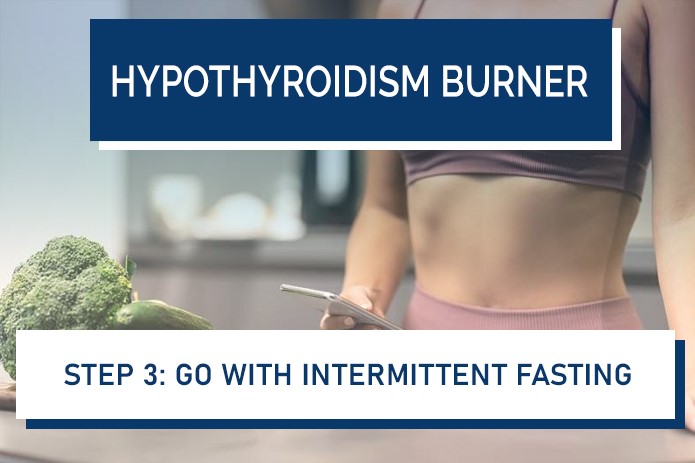
You may have heard about intermittent fasting before. Intermittent fasting has become a popular method for weight loss in recent years.
For those who don’t know, intermittent fasting is time-restricted fasting in which there is an 8-hour’ fed’ window in which you have to eat, and then you don’t have to eat anything in the 16-hour ‘fast’ window. People who do this 16:8 intermittent fasting stop eating at 7 pm, and then they do breakfast at 11 am after completing the fasting period.
Several studies linked many health benefits with intermittent fasting. Some of them are:
- Improved hormonal activity
- Weight Loss and help in getting slim
- Reduced type 2 diabetes risk
- Reduced inflammation and oxidative stress
- Reduced heart disease risk
Intermittent fasting is usually safe, even for people with hypothyroidism. Fasting only becomes a problem for people with thyroid problems when they fast for more than 16 hours. However, doctors consider intermittent fasting beneficial for treating hypothyroidism because, in the 16-hour fast state, the sugar and insulin levels remain low, which results in high hormone activity.
If you want to learn only one step of how to lose weight with hypothyroidism, then I suggest intermittent fasting. However, if you have never done intermittent fasting before, you can start with a 12 or 14 hours fast and then pick it up to 16 hours.
Jodi also suggests fasting to treat hypothyroidism naturally, but she doesn’t suggest sugar and dairy food items as they increase hunger in the fasting state.
Click here to learn more about Jodi’s program for the treatment of hypothyroidism.
Step 4: Reduce Stress:
Stress is a too common word these days, and it seems like all bad things and diseases occur due to stress. However, not all stress is bad for us. For instance, some level of stress allows us to grow and achieve our goals, making our lives meaningful.
However, the main problem is, we remain on an unhealthy diet. Stress works as a catalyst in negatively affecting our bodies. Researchers cannot find the exact reason why stress creates thyroid problems, but they consider stress as an environmental trigger.
Stress can create hormone imbalance in the body because sometimes the thyroid gland reduces thyroid hormone production in response to stress, and sometimes stress increases the production of hormones.
Here are some stress management techniques you can follow to release stress:
Improve Sleeping Pattern: Sleeping is the best way to reduce stress levels. You should get seven to nine hours of sleep. Studies showed that people who sleep less than eight hours have high-stress levels.
Move Your Body: Low thyroid level makes muscles weak, stiff, and itchy. Exercising reduces the stress level, and they also increase the production of endorphins, which work as painkillers, and elevate mood.
Seek Support: Leaning on the trusted person puts protective effects on mental and physical health. If not a family member, or a friend, you can seek support from a therapist, coworker, or a religious scholar.
Meditation: They are many ways to meditate and release stress. Deep breathing, yoga, listening to nature sounds, guided meditation, or mantra are some methods to reduce stress. Even a short time of meditation can have a positive impact on your body.
Step 5: Reduce Toxin Exposure:
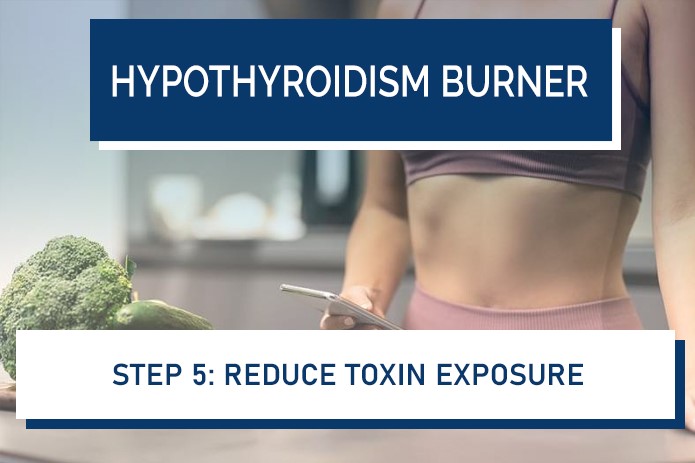
Toxins create problems in multiple ways. They can increase inflammation, obesity risk, hormone imbalance, and autoimmune disorder. We are exposed to hundreds, if not thousands, of toxins, but we have to reduce our exposure to three toxins in the environment that affect thyroid functions and cause weight gain.
These three toxins are:
Mercury: It is difficult to count any daily product that doesn’t contain mercury. From cosmetics to fish, to medicines, to cooking items and dental fillings. As I mentioned above, iodine is the crucial mineral for thyroid hormone production, and the thyroid gland is good at absorbing even slight iodine available in the body. Unfortunately, mercury and iodine are chemically similar, and the thyroid gland stores mercury in place of iodine that affects thyroid gland functions.
Perchlorate: This chemical is found in rocket fuel, fireworks, and fertilizers. Like mercury, perchlorate is also chemically similar to iodine and the thyroid gland stores it in place of iodine which reduces the production of T3 and T4 thyroid hormone. Additionally, perchlorate blocks the absorption of iodine.
Nitrates: Fertilizers and various foods contain nitrates which is a group of nitrogen and oxygen. Many processed foods contain nitrates as a preservative. Like mercury and perchlorate, nitrates are chemically similar to iodine, and the thyroid gland quickly absorbs them. It reduces thyroid function, and all these three toxins are linked to thyroid cancer.
Here’s how you can reduce your exposure to these toxins:
Clean Your Air: Air near coal-burning plants has a high mercury level, so avoid breathing near these places. Additionally, use a HEPA filter to clean air.
Clean Your Water: All these three toxins can come through the water supply. Skin can also absorb these toxin chemicals, so add a water filter in all taps and showerheads.
Buy Clean Foods: Buy organic and grass-fed food to reduce your exposure to these chemicals. However, it is difficult to eliminate these chemicals because even certified grass-fed foods grow on public water.
Must-Read: Discover How Jodi Is Treating Hypothyroidism In His Clients Within 4 Weeks
Step 6: Try Metabolism-Boosting Exercises:
People with hypothyroidism experience extreme fatigue, which makes exercise next to impossible. When you are tired and down, exercise is the last thing you want to do. However, exercises provide many health benefits, and you should keep your body moving if you have hypothyroidism or not.
Here I am providing you with five simple exercises which you can do to improve your metabolism and reduce stress.
Yoga And Stretching: Many women love doing stretching exercises because it helps them to become flexible. The best thing is, you can try various yoga poses in one session. You can join yoga classes, or you can follow a yoga DVD.
Walking: Walking is one of the best exercises you can do. It doesn’t need any special equipment, and you can do brisk walking anytime you want. Moreover, you can listen to your favourite podcast while walking as well.
Cycling: It doesn’t matter if you ride a bicycle with friends or alone. Bicycling is a great way to move your body. Cycling improves your overall body, and it puts a low impact on your joints.
Pilates: If you want to do a little bit more challenging exercise, Pilates is for you. Pilates exercises want your focus as you have to combine your breathing with your moves, and most of the exercises don’t need any weights.
Strength Training: Most women think strength training can give them manly muscles, which is wrong. Strength training is a great way to tone your body, and it is the best way to keep your metabolism high even after a workout session.
All these exercises will increase your metabolism, boost your energy levels, lift your mood, and improve your hormone balance. However, you should not do overtraining as it can increase stress.
If your busy schedule doesn’t allow you to do any of these exercises, you can take help from a 20-second movement technique to boost your metabolism and energy levels.
Check out this 20-second movement technique on this page for boosting metabolism.
Step 7: Supplement Your Diet:
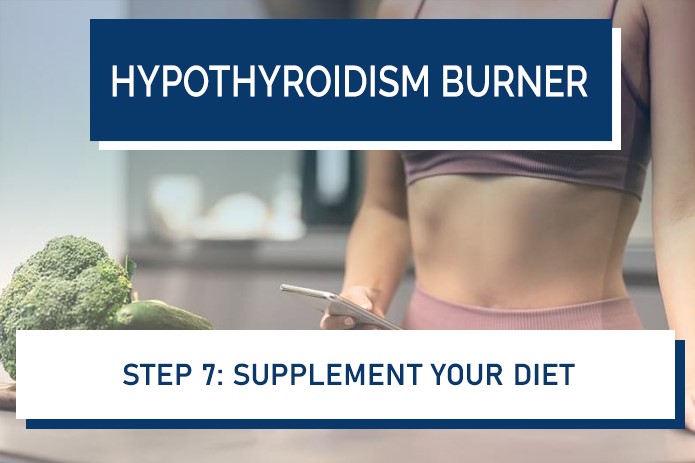
Various vitamins, minerals, and nutrients are required by the body to function properly. However, it is difficult to get them from foods, so for this reason, many people opt for supplements that can help them to manage hypothyroidism.
Here are the five beneficial nutrients you should know:
Iodine: Whenever you search for how to lose weight with hypothyroidism, you will find many articles on the importance of iodine. Some experts recommend iodine for people who have hypothyroidism because iodine is necessary for producing thyroid hormones. However, too much iodine can cause hypothyroidism. You should consult your doctor before using any iodine system.
Vitamin B: Vitamins provide many health benefits, and vitamin B can improve thyroid functions. You can take a supplement of entire vitamin B to improve thyroid functions, but you may need more vitamin B12 if your blood test report shows vitamin B12 deficiency. Some of the best sources of vitamin B are meat, yoghurt, nuts, milk, eggs, and grains.
Selenium: Selenium is an essential mineral for the mobilization of thyroid hormones. Additionally, selenium can reduce the antibodies working against thyroid peroxidase. Thyroid peroxidase is an enzyme that plays a critical role in the production of selenium. Some rich sources of selenium are tuna, shrimp, turkey, eggs, and lambs.
Zinc: Zinc is another vital mineral for hypothyroidism because zinc facilitates the conversation of T4 hormone to T3 hormone. Some rich sources of zinc are nuts, meat, shellfish, and legumes.
Summary:
So, we have come to the end of the Hypothyroidism Burner guide in which you learn how to lose weight with hypothyroidism using seven easy steps. You have to complete one step at a time, and once you complete all these seven steps, stick with them for at least two months to see benefits from them.
Even though you can lose weight with hypothyroidism, but the weight loss process will become much easier if you fix your thyroid problem before starting your weight loss journey.
I strongly recommend Jodi’s program for hypothyroidism treatment because Jodi can help you treat hypothyroidism naturally, and in between the process, you will also lose weight.
Check out this page if you want to learn more about Jodi’s program
Just remember, you have to regulate your T3 and T4 thyroid hormones with the help of medicines and foods. Take advantage of intermittent fasting and metabolism-boosting exercises to improve hormones activity. And finally, don’t forget to work with your doctor before using any supplement. Only your doctor can tell if you need any particular supplement.
I hope this Hypothyroidism Burner guide will help you in learning how to lose weight with hypothyroidism. Try to include these steps into your lifestyle one by one to get maximum advantage from them.

